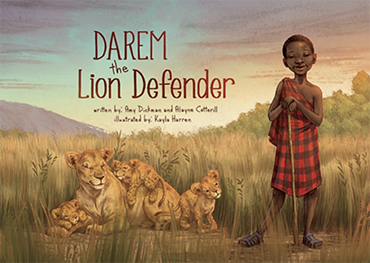Engaging communities in wildlife conservation through storybooks
A series of children's books, created by Lion Landscapes (part of Oxford’s Wildlife Conservation Research Unit) are helping to put communities in Africa at the heart of conservation efforts – and illustrating how wildlife, people and healthy ecosystems can co-exist.
 The first in the storybooks series.
The first in the storybooks series.Many lions live outside protected areas and may overlap with human settlements, sometimes resorting to attacking domestic livestock and even people. As a result, they’re often killed by local communities, putting substantial additional pressure on an already threatened species.
Oxford’s Wildlife Conservation Research Unit (WildCRU) works to understand and tackle pressing conservation issues, whilst one of its affiliated projects, Lion Landscapes, incentivises and enables the conservation efforts of local communities through a range of programmes in Kenya, Tanzania and Zambia.
Initially the Barabaig community in Tanzania were reluctant to engage with these conservation efforts. People are understandably wary of large carnivores and killing lions is often still an important part of what it means to be a warrior for such traditional pastoralist tribes. The community feared Lion Landscapes wanted to undermine their traditional practices, without properly considering their needs and interests.
WildCRU’s Professor Amy Dickman, who jointly leads the Lion Landscapes project along with Dr Alayne Cotterill, says: ‘Initially we attempted to share conservation messages with the community through film nights and discussion groups. But people were still wary, so we wanted to find a creative and inclusive way to engage them.’
Discussions with community representatives revealed that, although most people cannot read and write, the Barabaig were interested in stories about their community and culture and none of their stories had been written down. This sparked the idea of a storybook exploring the relationship between wildlife and people.
‘We worked with the community on every stage of the book,’ continues Professor Dickman, ‘from developing the story to checking all the details of the illustrations. And we were delighted that people of every age were so interested. Through the process of building the story we were able to have a productive dialogue about alternative ways to protect people, livestock, and the lions.’
The first book, Darem the Lion Defender, focuses on a young Barabaig boy who looks after the family cattle and gets to know a group of lions living on village land. When the lions attack one of the cows, Darem’s brothers and other young men from the village threaten to spear them in revenge. Darem is able to bring in the local Lion Defender programme, run by Lion Landscapes, which helps the village reinforce their fences to keep in the livestock. Ultimately, Darem’s brothers become Lion Defenders themselves and are rewarded for protecting, rather than killing, lions.
‘Although killing lions is often seen as beneficial to warriors, only the person who actually spears the animal is rewarded and the benefits are unpredictable,’ explains Dickman. ‘Under the Lion Defenders scheme, more warriors benefit regularly: we currently employ 18 warriors to patrol village land, look for signs of lions, and help protect people and livestock if lions are nearby. This means they’re still fulfilling the traditional, protective role expected of warriors in the community, but through lion conservation rather than killing.
‘People are delighted to be able to read the books in a local language and see the reality of their lives, and their role in conservation, faithfully represented,’ she continues. ‘The project has also brought additional benefits, through literacy classes, educational scholarships for both girls and boys, and investments in healthcare, education and veterinary supplies –which have all been requested by the community.
‘We’ve already produced the next book in the series, Haikya the Hyaena Friend, and there are more in the pipeline. The series is also a great way for children, parents and schools in the UK to explore conservation issues – so I’d encourage them to take a look!’
Amy Dickman is Professor of Wildlife Conservation, Director of WildCRU, and Co-CEO of Lion Landscapes
Darem the Lion Defender and Haikya the Hyaena Friend are published by Lion Landscapes, written by Amy Dickman and Alayne Cotteril (Co-CEOs of Lion Landscapes), illustrated by Kayla Harren. The books are available from the People's Trust for Endangered Species (PTES) webshop (delivery in the UK only) and in the onsite shop at Zoo Knoxville. Soft copies can be downloaded here.
Lion Landscapes acknowledges support from Zoo Knoxville, Woodland Park Zoo, Cincinnati Zoo and SOS IUCN / EU in the publication of the books.
Funders: USAID, PTES, Cleveland Metroparks Zoo, Cincinnati Zoo, Zoo Knoxville